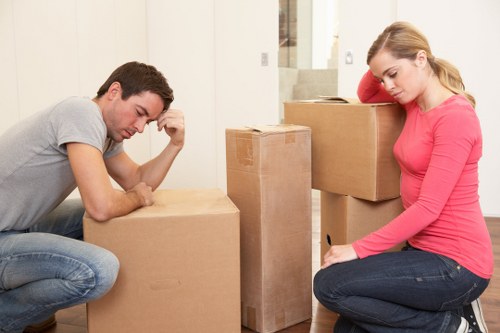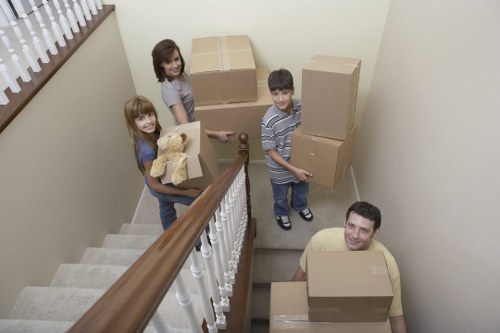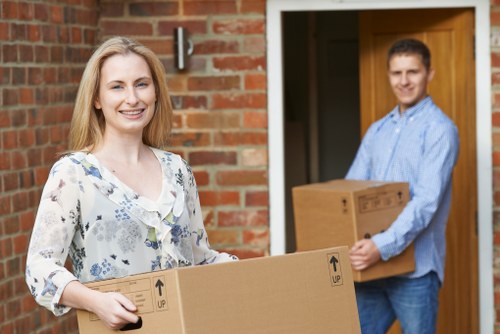Comprehensive Guide to Council Waste Collection in South East London

Managing household waste efficiently is essential for maintaining the cleanliness and environmental health of our communities. In South East London, council waste collection services play a pivotal role in ensuring that residents can dispose of their trash responsibly and sustainably.
This guide delves into the various aspects of council waste collection in South East London, providing you with all the information you need to navigate the system effectively.
From understanding different types of waste to knowing your collection schedules, we've got you covered.
Understanding Council Waste Collection Services

The council waste collection services in South East London are designed to manage household waste efficiently. These services include the collection of general waste, recycling materials, and bulky items that require special handling.
By providing regular waste collection, the council ensures that neighborhoods remain clean and free from unsightly litter and potential health hazards.
Moreover, these services are instrumental in promoting recycling and reducing the overall environmental impact of waste disposal.
Types of Waste Collected
Council waste collection typically involves several categories of waste:
- General Waste: Non-recyclable and non-compostable household waste.
- Recycling: Materials such as paper, cardboard, glass, metals, and certain plastics.
- Bulky Waste: Large items like furniture and appliances that cannot be collected through regular waste services.
- Garden Waste: Organic materials like grass clippings, branches, and other garden debris.
Recycling and Waste Disposal Guidelines

Proper recycling and waste disposal are crucial for minimizing environmental impact. South East London councils provide clear guidelines to help residents sort and dispose of their waste correctly.
Following these guidelines not only ensures compliance with local regulations but also contributes to broader environmental sustainability efforts.
Here’s how you can manage your waste effectively:
Sorting Your Waste
Effective waste management starts with proper sorting. Here's a breakdown of how to sort different types of waste:
- Paper and Cardboard: Newspapers, magazines, cardboard boxes, and office paper.
- Glass: Clear, green, and brown glass bottles and jars.
- Metals: Aluminum cans, tin cans, and scrap metal.
- Plastics: Bottles, containers, and certain types of packaging labeled with recycling codes.
- Organic Waste: Food scraps and garden waste for composting.
Collection Schedules and How to Prepare

Understanding your local waste collection schedule is essential to ensure your bins are out at the right times. Schedules can vary depending on your specific area within South East London.
Residents are advised to familiarize themselves with their collection days to avoid missed pickups and potential fines.
Preparation involves ensuring that waste is correctly sorted and that bins are placed at the curb on the designated days.
How to Prepare for Collection
Proper preparation can make the waste collection process smoother:
- Sort Your Waste: Follow the recycling guidelines to separate your waste.
- Use Appropriate Bins: Utilize the correct bins for general waste, recycling, and bulky items.
- Place Bins Correctly: Ensure bins are placed at the curb by 7 AM on collection days.
- Secure Your Waste: Make sure lids are closed to prevent animals from scattering your trash.
Common Waste Collection Challenges

Despite efficient systems, waste collection in South East London can face several challenges. Addressing these issues is vital for maintaining service quality and environmental standards.
Common challenges include missed collections, overflowing bins, and improper waste sorting.
Understanding these challenges can help residents take proactive measures to mitigate them.
Missed Collections and How to Report
If your waste hasn't been collected as scheduled, it's important to report it promptly. Most councils in South East London offer online reporting tools and customer service lines to handle such issues.
Timely reporting ensures that the problem is addressed swiftly, maintaining the cleanliness of your neighborhood.
- Check Your Schedule: Confirm that collection wasn't rescheduled due to holidays or weather conditions.
- Use Online Portals: Many councils provide websites where you can report missed collections.
- Contact Customer Service: Reach out via phone or email if online reporting isn't available.
Utilizing Waste Collection Resources

Residents of South East London have access to various resources to assist with waste management. These include online tools, mobile apps, and community programs aimed at promoting effective waste disposal and recycling.
Leveraging these resources can enhance your waste management practices and contribute to a cleaner environment.
Here’s how you can make the most of these resources:
Online Tools and Mobile Apps
Modern technology offers convenient ways to stay informed about waste collection schedules and recycling guidelines:
- Council Websites: Access detailed information about waste services and updates.
- Mobile Apps: Receive notifications about collection days and recycling tips.
- Interactive Maps: Locate nearby recycling centers and bulk waste collection points.
The Role of Residents in Effective Waste Management

Residents play a crucial role in the success of council waste collection services. By adhering to guidelines and actively participating in recycling programs, individuals can significantly impact the efficiency of waste management systems.
Community involvement ensures that waste collection services remain effective and that environmental standards are upheld.
Here are some ways to contribute:
Community Participation
Engaging with your local community can enhance waste management efforts:
- Join Recycling Programs: Participate in local recycling initiatives and bulk waste collection drives.
- Attend Workshops: Learn about sustainable waste disposal practices through community workshops.
- Promote Awareness: Encourage neighbors and friends to follow proper waste disposal methods.
Nearby Areas and Their Specific Waste Collection Features
South East London encompasses a diverse range of areas, each with its unique waste collection features. Understanding these can help residents navigate their specific local services more effectively.
- Greenwich: Known for its extensive recycling programs and community composting initiatives.
- Lewisham: Offers regular bulky waste collection and specialized disposal services for electronic waste.
- Bromley: Features a robust recycling infrastructure with numerous drop-off points.
- Bexley: Implements innovative waste reduction strategies and resident education programs.
- Lewisham Provides comprehensive garden waste collection alongside regular services.
- Woolwich: Hosts periodic waste collection events and partners with local businesses for sustainable practices.
- Sidcup: Focuses on minimizing landfill use through advanced recycling techniques.
- Eltham: Encourages community participation in waste management through local initiatives.
- Orpington: Maintains efficient waste collection schedules tailored to resident needs.
- Deptford: Integrates waste collection with urban renewal projects to enhance city cleanliness.
- Blackheath: Offers specialized services for hazardous waste disposal.
- Crystal Palace: Combines waste collection with green space maintenance for a cleaner environment.
- Charlton: Promotes waste segregation at the source to improve recycling rates.
- Catford: Provides accessible waste collection points in residential areas.
- Herne Hill: Implements eco-friendly waste collection practices to support sustainability goals.
Environmental Impact of Effective Waste Collection

Effective waste collection has a significant positive impact on the environment. By ensuring proper disposal and recycling of waste, South East London councils help reduce landfill usage, lower greenhouse gas emissions, and conserve natural resources.
Moreover, these practices contribute to a healthier ecosystem and promote sustainable living among residents.
Understanding the environmental benefits can motivate individuals to adhere to waste management guidelines diligently.
Reducing Landfill Usage
Proper waste collection and recycling minimize the amount of waste sent to landfills. This reduction helps prevent soil and water contamination and mitigates the emission of harmful gases like methane.
- Recycling: Converts waste materials into reusable products, decreasing the need for new resources.
- Composting: Transforms organic waste into nutrient-rich compost, reducing landfill volume.
- Waste-to-Energy: Some councils utilize waste-to-energy facilities to generate electricity from non-recyclable waste.
Conclusion
Council waste collection services in South East London are integral to maintaining clean, sustainable, and healthy communities. By understanding how these services operate, adhering to guidelines, and actively participating in waste management initiatives, residents can contribute significantly to environmental preservation and community well-being.
Frequently Asked Questions
1. How often is waste collected in South East London?
Waste collection frequencies vary by area. Generally, general waste and recycling are collected weekly, while bulky items may be collected monthly or upon request. It's best to check your local council's website for specific schedules.
2. What items are considered recyclable in South East London?
Recyclable items typically include paper, cardboard, glass bottles and jars, metal cans, and certain plastics. Always ensure items are clean and sorted according to your council's guidelines.
3. How can I report a missed waste collection?
You can report a missed collection through your council's online portal, by phone, or via email. Providing details like your address and the type of waste missed will help expedite the resolution.
4. Are there any items that should not be placed in the recycling bin?
Yes, items such as electronics, batteries, certain plastics, and hazardous materials should not be placed in the recycling bin. These require special disposal methods and should be taken to designated collection points.
5. What should I do with bulky waste in South East London?
Bulky waste can usually be collected by scheduling a special pickup through your local council. Alternatively, you can take items to designated bulky waste collection sites. Check your council's website for specific instructions and available services.